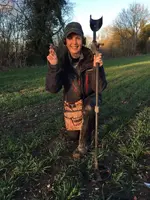garryson
Bronze Member
- #1
Thread Owner
[h=2]Maidenhead search society member Sue Washington uncovers warrior burial site near the town of Marlow in Berkshire.[/h]A metal detectorist has uncovered a warrior burial site near the Berkshire town of Marlow that is so significant it could change historians’ understanding of southern Britain in the sixth century.

Read more: https://inews.co.uk/news/science/me...r-understanding-of-anglo-saxon-britain-676810

Read more: https://inews.co.uk/news/science/me...r-understanding-of-anglo-saxon-britain-676810



